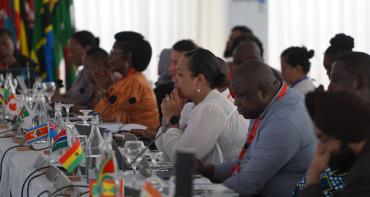Seventy Tanzanian judges, prosecutors and investigators took part in an intensive Commonwealth symposium this week designed to sharpen their skills in handling cybercrime cases and making the internet safer for citizens.

Organised by the ĚÇĐÄĚ˝»¨ and supported by the UK’s Foreign, Commonwealth, and Development Office, the symposium was held in Dar es Salaam from 2 to 4 October 2024.
During the symposium, participants engaged in simulations and group exercises to deepen their understanding of cyber threats, such as fraud, exploitation and phishing, while examining the vulnerabilities of internet users in Tanzania.
Through a series of case studies and fictional scenarios, they explored strategies to combat emerging cyber threats, such as artificial intelligence-generated deep fakes, by leveraging domestic laws and international treaties.
Guided by cybercrime experts, participants gained practical skills to apply internationally recognised good practices within their professions, gather electronic evidence admissible in court and foster cross-border cooperation to prosecute cybercrimes.
A global threat
Opening the symposium, Justice Augustine G. Mwarija, Justice of Appeal, Tanzania, described cybercrime as a rapidly evolving “global threat” impacting people, businesses and governments.
He continued:
“Judges today must be equipped to navigate the complex landscape of digital crimes and the accompanying technical evidence. A strong understanding of both substantive and procedural cybercrime law is crucial for making informed decisions on the admissibility and relevance of electronic evidence.
“The symposium offers an invaluable opportunity to share knowledge, experiences, and best practices, enabling us to improve our collective capacity to combat cybercrime.”
High Court Judge Lilian Itemba, one of the participants, underscored the pressing need for the symposium, pointing out that cybercrime in Africa is increasing by 25 per cent every year, with Tanzania being no exception.
“Many people struggle with preserving electronic evidence, as it differs from physical evidence,” she said. “Here we have learned techniques like imaging and hashing, which help verify the origin of electronic evidence for court proceedings. This will enable us judges to make informed decisions based on competent evidence.”
Hands-on approach
Another participant, John C. Mdoe, Senior Resident Magistrate, praised the symposium’s hands-on approach, particularly valuing the lessons on authenticating and admitting electronic evidence, which he believes would enhance his ability to manage cybercrime cases.
In her remarks, Elizabeth Macharia, Head of the Secretariat’s Rule of Law Section, highlighted the tangible success of previous symposiums, mentioning that in one beneficiary country, judicial officers saw a 50 per cent increase in efficiency when handling electronic evidence.
“This improvement,” she explained, “has not only expedited justice for victims but also led to more effective prosecutions of cyber criminals.”
Macharia expressed optimism that the symposium would have a similar impact in Tanzania.
She encouraged the participants, saying, “The knowledge and skills you gain here will empower you to tackle the complex challenges of cybersecurity and make the internet a safer place for everyone in Tanzania.”
The symposium was hosted in collaboration with Tanzania’s Institute of Judicial Administration Lushoto.
Since 2018, the Secretariat’s Cyber Unit has trained about 1,200 law enforcement officers, prosecutors, and judicial officials from 55 of the 56 Commonwealth member countries.
Media contact
-
Snober Abbasi, Senior Communications Officer, Communications Division, ĚÇĐÄĚ˝»¨


